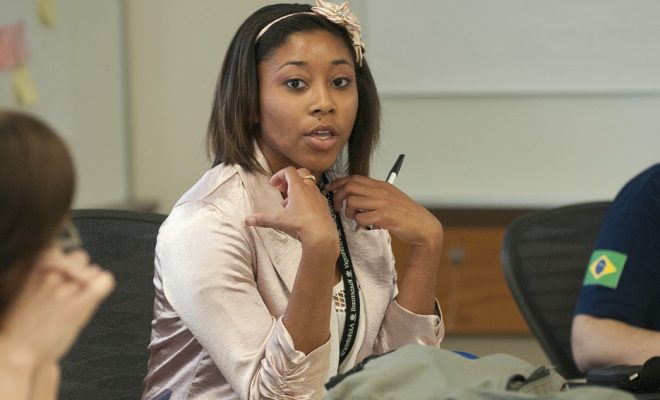America’s Nobel success is the story of immigrants

This article was written by Adil Najam
If it were not for Bob Dylan – the singer, songwriter and now Nobel laureate – 2016 would have become the first year since 1999 without a Nobel winner born in the United States.
Since World War II, the U.S. has dominated the four research Nobels (in medicine, chemistry, physics and economics). It did so this year too. But there was a difference: None of the nine scholars who shared the four research Nobel Prizes in 2016 was born in the United States. However, as many as six of the winners work at U.S. universities and now call the United States as their home.
In other words, this year, as in so many others, America’s Nobel success was a story of immigrants. At a time when immigration has become a hot-button issue, this fact did not go unnoticed, including by the White House.
So why does this matter?
I have been associated with U.S. academia for a quarter-century – first as a student from Pakistan and then as a researcher, a teacher and more recently a university administrator. I have experienced the magical embrace of U.S. higher education firsthand.
I believe the diversity of the Nobel winners is a testimony to the spectacular exceptionalism of U.S. higher education: U.S. academic institutions attract, welcome, embrace and ultimately benefit from the best intellectual talent from all corners of the world.
Race to the top
There are many things that make American higher education truly exceptional. Immigration, and the ease and openness of U.S. academia to scholars from across the world, is certainly not the only one.
But, it is an important one.
In fact, many other countries are trying hard, though less successfully, to replicate the U.S. experience. For example, countries such as Singapore, South Korea, even Saudi Arabia, which are investing heavily in building their own research universities, begin by trying to attract top researchers from across the world. They offer them incentives such as outstanding facilities and lucrative salaries.

Nobel Academy in Stockholm. William Marnoch, CC BY
Such incentives help. But they are not enough. U.S. universities are quite unique in the way they welcome and embrace talent, which helps attract the best in the world.
The journey of Nobel laureate Ahmed H. Zewail (who received the Nobel for chemistry in 1999) is illustrative of the exceptionalism of U.S. higher education and the culture of openness. Writing about his journey from his native Egypt to U.S. academia, Zewail describes how he was embraced by all the universities he was part of – whether as a student at University of Pennsylvania, as a postdoc at University of California, Berkeley or as a professor at California Institute of Technology.
“My science family came from all over the world and members were of varied backgrounds, cultures, and abilities. The diversity in this ‘small world’ I worked in daily provided the most stimulating environment, with many challenges and much optimism.”
America’s research excellence
The history of the Nobel awards is, in fact, a rather neat lens through which we can see this play out.
The very first American to win a Nobel in the sciences was Albert A. Michelson. He was awarded the prize in 1907 for his research on the measurement of the speed of light. Michelson’s parents had immigrated to the United States from Strzelno in then Prussia, now Poland, when he was only two years old.
Since its inception in 1901, the Nobel Prizes and the Prize in Economic Sciences have been awarded 579 times to 911 people and organizations. The U.S. alone has had more than 350 Nobel winners. More than 100 of these have been immigrants and individuals born outside of the United States.
No other country comes close. The two countries apart from the U.S. that can claim more than 100 laureates are the United Kingdom and Germany. What is noteworthy is that a number of winners of both these countries were living and working in the U.S. when they were awarded their Nobel.
In fact, if it were to be a category of its own, immigrants to the U.S. who won the Nobel, would would come second only to the U.S.-born laureates group. Their number exceeds that of laureates born in any single country.
The point is the global movement of intellect and ideas is often necessary and perhaps central to the creation of knowledge and production of great research. The United States has both immensely contributed to and benefited from the excellence of such research.
With increasing globalization, this trend will not slow down. If anything, this trend is on the rise and is likely to continue. Consider, for example, the research Nobels awarded to those in the United States in the last two years. Of the ten laureates who live, teach and work in the United States, all but one were born outside the U.S, and six studied in U.S. universities.
Attacks on openness are misguided
Great research is a truly global enterprise. In context of current conversations on immigration – and the notion that somehow immigrants might be thwarting America’s “greatness” – it is instructive to note just how much of America’s great success in Nobel Prizes has come because of immigrants.
Attacks on American openness are not just misguided, they are self-defeating.
Trump supporters in the United States – much like Brexit supporters across the Atlantic – seem worried that this embrace of the outsider is making America less great.
As America’s Nobel success testifies, they could not be more wrong.
![]()
Adil Najam, Dean, Frederick S. Pardee School of Global Studies, Boston University
This article was originally published on The Conversation. Read the original article.






